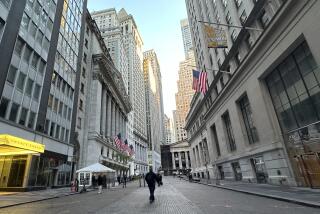Time to Take Another Look at Investments
OK, so it doesn’t look like the economy is tanking after all. Since a few weeks ago, when many economists thought we were likely to slip into a recession, recent economic data has indicated that the economy may be stronger than previously thought.
That being the case, where should you put your money? The stock groups that led the summer rally no longer are front-runners, while the long-term bonds that looked so good when interest rates were tumbling now look boring.
Here’s a brief rundown on the outlook for stocks, bonds, savings and precious metals:
* Stocks. Fears of a correction in the market are still widespread, despite recent new highs in the Dow Jones industrial index. Some danger signs, such as low dividend yields relative to bonds, indicate that caution is still in order for individual investors.
Some of the smartest money managers around, such as Michael Price of the Mutual Shares mutual fund and John Neff of Windsor Fund, say it is getting harder to find bargains and have raised the level of cash in their portfolios.
But a stronger economy should boost corporate earnings, which in turn should portend continued activity in mergers, leveraged buyouts and other takeover plays. They have been a major prop to the market.
“We have some time before we have to start worrying about recession again. That’s good for stocks,” says Arnold Kaufman, editor of Standard & Poor’s Outlook newsletter.
If you’re going to go with stocks, consider issues in such cyclical industries as chemicals, paper and railroads, which should benefit from a stronger economy, suggests Michael Metz, chief investment analyst at Oppenheimer & Co.
But don’t jump too heavily into these groups, Kaufman cautions. That’s because there has been considerable action in them already. Also, he predicts, recession fears could crop up again. Therefore, he says, so-called defensive stocks that are generally resistant to recession--such as foods, pollution control, telephone utilities, drugs--could return to lead the market again.
As for mutual funds, one group that has under-performed this year, but should do well in a continued market rally, are funds investing in small, growth-oriented companies. A continued strong economy should boost their earnings relative to slower-growth companies.
“It’s getting easier to make a case for growth stocks, they’ve been out of favor for so long,” says Donald J. Phillips, editor of Mutual Fund Values, a Chicago-based investment advisory service. Among growth funds he recommends are Twentieth Century Growth (800-345-2021) and T. Rowe Price New Horizons Fund (800-638-5660).
Kurt Brouwer, president of Brouwer & Janachowski, a San Francisco money management firm, also likes so-called equity income funds that invest in stocks with high dividend yields. These should provide protection in case the market weakens. Funds he likes include Vanguard Equity Income Fund (800-662-7447), T. Rowe Price Equity Income and Fidelity Equity Income (800-544-6666).
* Bonds. A stronger economy means that the Federal Reserve won’t be loosening the money supply to any great degree. That means interest rates won’t go down much, if at all, in the near future. That’s not great news for long-term bonds and long-term bond mutual funds, which enjoyed sharp rises in the spring when long-term interest rates fell from more than 9% to less than 8%.
“The party’s largely over” in long-term bonds, Brouwer says.
But short- and intermediate-term bonds and funds, investing in bonds with 2- to 10-year maturities, remain attractive, Brouwer says. He recommends Neuberger & Berman Limited Maturity Bond Fund (800-877-9700).
Also, the lack of further sharp declines in interest rates should bode well for money market funds, which are currently yielding an average 8.64%. Among the highest yielding are Vanguard Money Market Reserves-Prime, at 9.16%.
* Savings. This could be a good time to lock up some money in a higher-yielding certificate of deposit. For one, major banks and thrifts in California are offering some of the highest average yields on six-month and one-year certificates of deposit among major institutions in the nation, according to 100 Highest Yields, a North Palm Beach, Fla., newsletter that tracks savings rates.
Also, October is a big month for CD maturities, and institutions nationwide are expected to roll out big advertisements and other promotions with attractive rates to lure depositors.
* Precious metals. This is an area that you may not want to step into now but might want to have some cash ready to pounce on later. Gold has been a laggard in the investment world in the past year, but prices have been so beaten down that the downside risk is minimal, many analysts say. Further price declines would trigger mining companies to curtail production, squeezing supplies and thus putting a floor on prices.
And if the economy heats up, any renewed inflation would bode well for gold, a strong inflation hedge.
Bill Sing welcomes readers’ comments and suggestions for columns but regrets that he cannot respond individually to letters. Write to Bill Sing, Personal Finance, Los Angeles Times, Times Mirror Square, Los Angeles, Calif. 90053.
More to Read
Inside the business of entertainment
The Wide Shot brings you news, analysis and insights on everything from streaming wars to production — and what it all means for the future.
You may occasionally receive promotional content from the Los Angeles Times.










